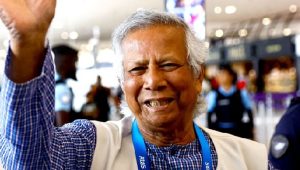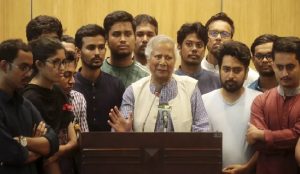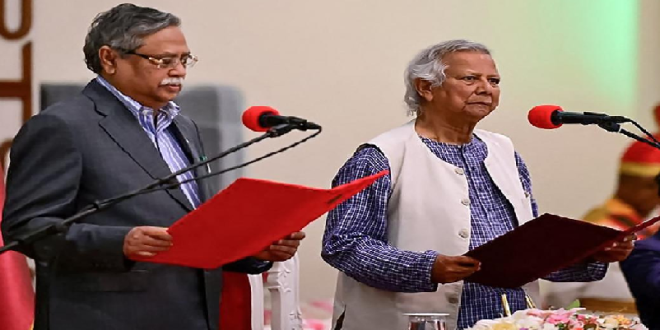09-08-2024
Nobel laureate Muhammad Yunus departed France Wednesday, heading to Bangladesh to lead the country’s interim government after mass protests ousted Prime Minister Sheikh Hasina.
Muhammad Yunus has been asked to head the interim government in the wake of the political crisis that saw Prime Minister Sheikh Hasina flee the country on Monday.
 Yunus, 84, who hailed the weeks-long student-led protests that brought down the Hasina government as a “Second Victory Day”, has been a critic of Hasina’s 15 years of iron-fisted rule.
Yunus, 84, who hailed the weeks-long student-led protests that brought down the Hasina government as a “Second Victory Day”, has been a critic of Hasina’s 15 years of iron-fisted rule.
The protests began against a job quota, which reserved more than half the posts to particular groups including one-third for the descendants of 1971 war veterans. It was scaled back by the Supreme Court on July 21, but it did not assuage the protesters.
“This is our beautiful country with lots of exciting possibilities. We must protect and make it a wonderful country for us and for our future generations,” Yunus told reporters. The economist and entrepreneur takes over the reins of the country after one the deadliest protests in its history, which saw more than 300 killed and thousands arrested. Big challenges lie ahead as he has to establish law and order, revive the economy, and pave the way for free and fair elections.
Ahmed Ahsan, a former World Bank economist and a director of the Policy Research Institute in Bangladesh, says Yunus “is the man of the hour, chosen by the students who spearheaded the entire movement”.
“He commands enormous respect both in the country and in the world,” Ahsan told media. Yunus, the third of nine children, was born in 1940 in a village near the southern port city of Chittagong in what was then East Pakistan.
He graduated from the University of Dhaka in 1961. He joined Vanderbilt University in the United States in 1965 on a Fulbright scholarship for his PhD in economics, which he completed in 1969. He went on to become an assistant professor at Middle Tennessee State University in Murfreesboro, Tennessee in the US.
 During the 1971 liberation war against the Pakistani military, Yunus supported efforts to create an independent Bangladesh. He founded a citizens’ committee in the US city of Nashville and helped run the Bangladesh Information Center in Washington, DC, which lobbied the US Congress to stop military aid to Pakistan.
During the 1971 liberation war against the Pakistani military, Yunus supported efforts to create an independent Bangladesh. He founded a citizens’ committee in the US city of Nashville and helped run the Bangladesh Information Center in Washington, DC, which lobbied the US Congress to stop military aid to Pakistan.
In 1972, Yunus returned to an independent Bangladesh, and after a brief spell in the country’s new Planning Commission, joined the economics department of the University of Chittagong.
In 1976, he visited nearby villages in Chittagong that were affected by famines a few years earlier as part of his field work at the university. Yunus lent 42 people in the village $27 and found that each of them paid the money back as scheduled.
He found out that small loans or microcredits given to poor villagers made a huge difference. Traditional banks would not lend them money, forcing them to rely on unscrupulous money lenders who charged exorbitant interest rates.
This was the beginning of Grameen Bank (village bank) which pioneered the provision of microcredit to poor people to allow them to start up new businesses. Yunus became known as the “banker to the poor” as he helped lift millions out of poverty through his Grameen Bank.
By that time, the bank had lent more than $7bn to over seven million borrowers, 97 percent of them women, with a repayment rate of nearly 100 percent.
“I see poor people are getting out of poverty every day … we can see that we can create a poverty-free world… where the only place we’ll see poverty will be in the museums, poverty museums,” Yunus said at the time. (Int’l Monitoring Desk)
 Pressmediaofindia
Pressmediaofindia




